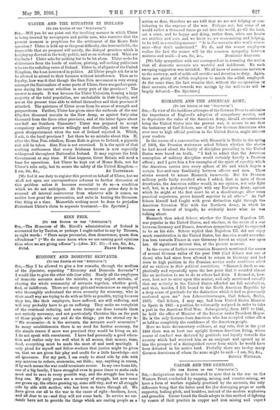ECONOMY AND DOMESTIC SERVANTS.
[To TER EDITOR OF THE " SPECTATOR.1 Brn,—May I be allowed to give a few remarks, through the medium of the Spectator, regarding " Economy and Domestio Servants" ? I would like to give the other side (our side). Nearly all the employers of domestic servants make the mistake, a very unjust mistake, of classing the whole community of servants together, whether good, dyad, or indifferent. There are many girls and women now so employed who thoroughly understand the stern necessity for economy, who in their small way are trying to do with as little as possible, trying because they too, like their employers, have suffered, are still suffering, and will very probably have to go on suffering. They make no complaint of the continual reducing, and some things are done towards them not entirely necessary, and not particularly Christian-like on the part of those people who say and do the things ; yet the eternal cry is: ' We economize—it is the servants, the servants won't economize." In many establishments there is no need for further economy, for the simple reason if moro was practised they would be living on air. I do not speak with resentment. I have had personally a good educa- tion and realize only too well what it all means, that money, time, food, everything must be made the most of and used sparingly. I only plead for myself and fellow-workers that justice might be given us, that we are given fair play and credit for a little knowledge—not all ignorance. For my part, I am ready to stand side by side with any mistress to reduce, economize, eat little ; nay, anything in reason, if by such means the war could terminate sooner. In my own home life, ono of a big family, I have struggled even in peace times to make ends meet and to save in every possible way, and the struggle has been a long one. My early years are a memory of struggle, but now some are grown up, the others growing up, some still tiny, and we all struggle :side by side with mother, who has been so brave through all. We -have given our all to the war in the cause of right—brothers, lover, and all dear to us—and they will not come back. In service we cer- tainly have not to provide the things which are costing people as a
nation so dear, therefore wo are told that wo are not helping or con- tributing to the expense of the war. Perhaps not, but some of us would rather a thousand times go out into the world, go till the land, eat a crust, and be happy and doing, rather than, when our hearts are stricken and sore, and we know we are economizing and helping, to be told in a crushing manner: " It is the servants who won't econo- mize—they don't understand." We do, and the sooner employers realize tho fact the sooner will be the common sympathy between
mistress and maid.—I am, Sir, &c., DOMESTIC SERVANT.
[We fully sympathize with our correspondent in resenting the notion that all domestic servants are wasteful and indifferent. No such swooping suggestion was intended. We all know of numerous instances to the contrary, and of noble self-sacrifice and devotion to duty. Again, there are plenty of selfish employers to match the selfish employed. At the same time, the fact remains that, without the co-operation of their servants, efforts towards war savings by the well-to-do will be largely defeated.—ED. Spectator.]






























 Previous page
Previous page